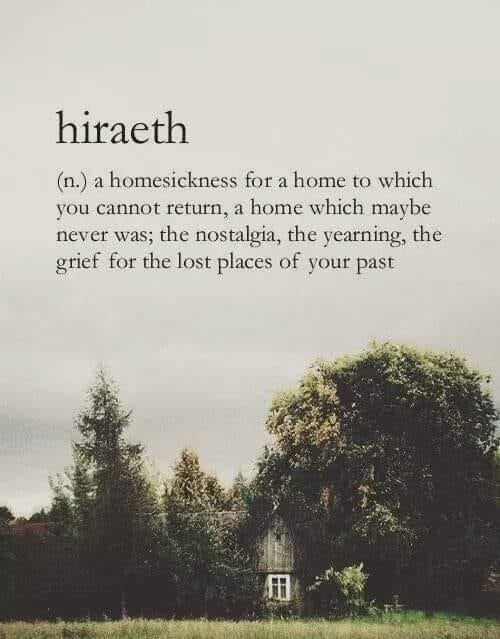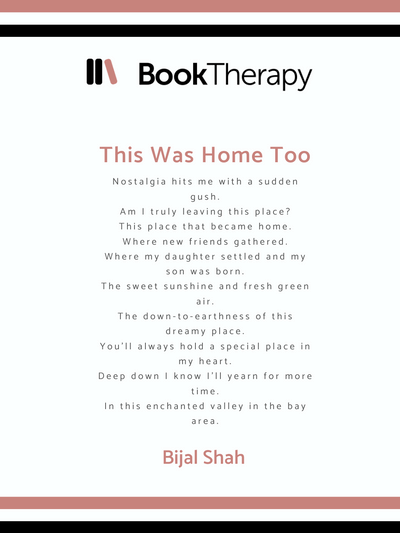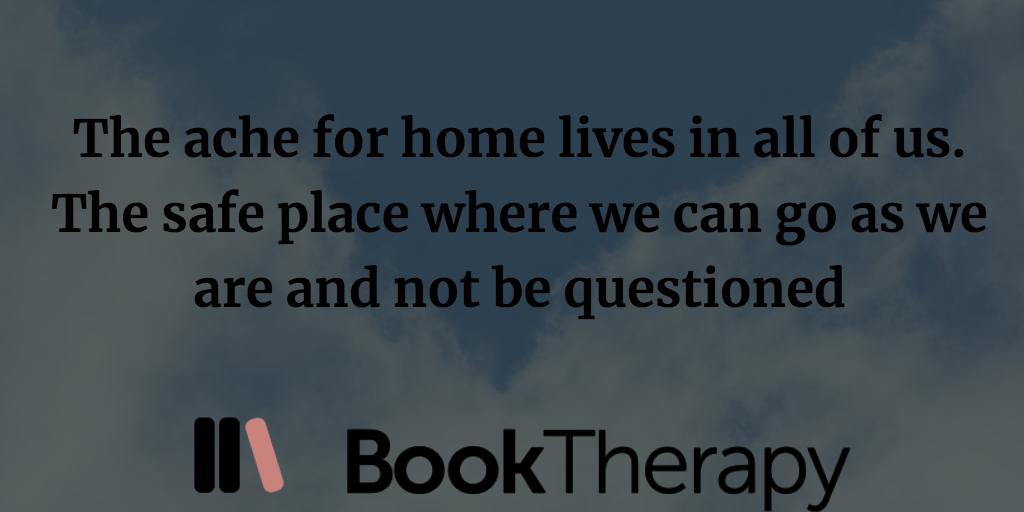People, Places and Home
Posted by Bijal Shah on
 Photo by Miltiadis Fragkidis on Unsplash
Photo by Miltiadis Fragkidis on Unsplash
Nairobi, London, Sydney and Palo Alto. These have been home over the last 37 years — either with my kids and husband, or with my husband, or just me, or with my parents and brother. As a consequence, home has taken on various shapes and forms. With children in the picture, a primal force to nest, root and baptise a home that they can call their own has been nagging me. Penning lucid thoughts and feelings, what ‘home’ is and what it means to ‘be home’ unravels on fresh pages.
You rent and you own. For now, I live in rented accomodation with my husband and two kids. My rented accomodation is home. I do own property that I rent out. At one point, I lived in these owned properties. Now these are rented — and overnight their appeal as home has vanished.
Even then, the fact that we are renting is often viewed as inferior by family and friends. What does true home ownership even mean? Aren’t we just renting the space that we live in for the period of time that we’re going to be alive? Why does renting make it any less a home? Owned property may pass onto the next generation (if we have kids, nieces or nephews, godchildren or similar). Or it may not. It might be at a hefty cost such as inheritance tax, forcing our inheritors to sell, becoming someone else’s. Or we might not have anyone to pass it on to.
So then why are we so hung up on home ownership as the more superior of the two options.
What about the notions of simultaneous homes — I’ve lived in San Francisco and I’ve lived in London over the period of 2 years — they were and are both home for me and my kids. Whenever I’m in one of the two cities, I mourn the absence of the other — in some forever, ambivalent state. Feeling nostalgic, I want to be in in two places at once. I miss the people on both sides of the pond. These were the people who made home, HOME.

My heritage is Jain — my parents, grandparents, great grandparents (and probably beyond) come from a village in northwest India in the state of Gujarat and are Jain by religion and culture. Jainism, similar to Buddhism, practices detachment, i.e. that the root of all suffering is attachment. Attachment to objects, people, desires. The path to enlightenment is meant to be detachment of all of these things. Is this the answer, then to make home wherever we are — and not be too rooted in one place or the other? The early Jain disciples found shelter wherever they were. Nomadic in nature, for them, they believe that avoiding attachment, reduced suffering.
However is this the point of life? To avoid any sort of attachments, for fear they might bring suffering? “Surely to avoid attachments for fear of loss is to avoid life” says Lionel Shriver in the highly acclaimed “We Need to Talk About Kevin”. Viktor Frankl, the prominent Viennese psychiatrist and Auschwitz survivor, author of “Man’s Search for Meaning: The classic tribute to hope from the Holocaust” says that suffering helps us find meaning in our lives and without suffering, without attachment to things that we love, how do we make our lives meaningful and draw purpose? Home as an attachment is a part of this equation for the search for meaning. It’s a place that’s special to us, that gives us credence (just ask somebody who’s homeless). A place where after a long day at work we retire to. The place where we celebrate our greatest successes, mourn our deepest sorrows, nourish ourselves, expose our vulnerabilities, connect with our family, rest and find stability in an inevitable, chaotic world.
Sometimes home is a person, a mother, a father, a grandparent, a guardian who have sheltered us from life’s darker moments and whom we return to over and over again as a safe base, that walls us momentarily as we draw the courage to head out again to face the daily circus of life. In the book “What My Mother and I Don’t Talk About”, Michele Filgate says “Our mothers are our first homes, and that’s why we’re always trying to return to them. To know what it was like to have one place where we belonged. Where we fit.” Perhaps home is where we belong, where we fit and where there is unconditional acceptance of who we are. It gives us an identity, makes us whole, makes us truly belong. That is home, where the heart is wholeheartedly embraced, values honoured, where you know what to expect and where you’ll find the people you love, who love you back. It’s where you’re allowed to be vulnerable, naked in body, mind and soul.

For those, whose families are no longer with them, or who have outgrown their family relationships, the definition of home might be different. For them home might be the place that provides them with the freedom to be who they want to be. To be free from commitments, burdens, expectations — a place where their privacy is guaranteed and where they hold the ultimate reigns to do what they wish with no one to judge. It’s where we can find solitude. In Japan, this freedom and notion of solitude has really turned what home means on its head, as evidenced by the popular books, Convenience Store Woman by Sayaka Murata Kodoku no Susume (Advice for the Lonely) by Hiroyuki Itsuki and Akiko Shimoju’s hugely popular Gokujou no Kodoku (Top-notch Solitude). Twice as many Japanese live alone now as did 30 years ago. These books are popularising solitude and living on your own continues to rise— to them the freedom solitude offers is a relished luxury.
Living in the age of the internet, we often have two homes, the online one and the offline one. We’re constantly reconciling our offline, physical world with our online, virtual one. Photos, memories saved online, digital notes and precious emails become the sanctuary for ‘an online home’ — one where we retreat to, to bathe in delicious memories of time gone by, savouring a thought from the past or looking up our plans and aspirations for the future.
For others home is a nostalgic feeling, one which reigns over the story of our lives, which anchors us and gives us hope, peace and privacy wherever we find ourselves.
Home is found in a book, as Jeanette Winterson states in her brilliant novel, a meditation on belonging, love, identity, a home and a mother, “Why Be Happy When You Could Be Normal”. She says “Books, for me, are a home. Books don’t make a home — they are one, in the sense that just as you do with a door, you open a book, and you go inside. Inside there is a different kind of time and a different kind of space”.
In this vein, libraries have become our time-tested home. As Germaine Greer, discusses in her feminist biography, “Daddy, We Hardly Knew You”, “Libraries are reservoirs of strength, grace and wit, reminders of order, calm and continuity, lakes of mental energy, neither warm nor cold, light nor dark … In any library in the world, I am at home, unselfconscious, still and absorbed.”
Libraries connect us to other people, to other readers engaging in books, to fictional characters who’ve moved us in some way or who we can relate to, to authors who’ve sadly passed away but whose spirit remains gorgeously alive in the preserving consciousness of the library. It offers hope, escapism and connection. It’s hardly surprising that libraries are so loved and cherished and for these reasons remind us of home. For me personally, libraries have been a temple of belonging. Every place I’ve settled, whether that’s Palo Alto, London, Nairobi or Sydney, public libraries have become the heart of community life, whilst giving me the time and space to escape into the imaginary communities of fiction once in a while.
Whatever home means for us individually and collectively, one thing is for sure, we all have an innate need for ‘home’, something to return to, whether that’s a place, person, feeling, time, language, space, memory or experience.
 Maya Angelou’s All God’s Children Need Travelling Shoes
Maya Angelou’s All God’s Children Need Travelling Shoes
A big hello and thank you for reading! Passionate about literature, psychology, and life I launched Book Therapy as an alternative form of therapy using the power of literature. I create reading lists/personalised book prescriptions based on your individual needs, this is my signature personalised reading service. My book recommendations have featured in The Guardian, NBC News and Marie Claire. You can also check out Book Therapy’s free reading lists and A- Z of book prescriptions (covering both fiction and non-fiction). These suggest books based on your existing life situation (e.g. anxiety, job change, relationship heartache) as well as interests (e.g memoir, historical fiction, non-fiction, crime etc). There’s also a Children’s A — Z of Book Prescriptions. Feel free to check out the blog for more literary gems. There’s also a post on my personal story of how I entered the world of bibliotherapy and book curation. I train mental health professionals, librarians, teachers as well as readers on using bibliotherapy in their own work through our online Bibliotherapy, Literature and Mental Health course. And if you’d like to connect, email me at bijal@booktherapy.io or www.booktherapy.io. Download the Book Therapy App filled with bibliotherapy resources and literary curation tools, it's perfect for book lovers!
In this role, I have had the opportunity to publish two books called Bibliotherapy: The Healing Power of Reading and The Happiness Mindset, and write various literary essays and pieces for newspapers and magazines.
I have undertaken bibliotherapy workshops for The United Nations, various libraries in New York and corporate organisations in the UK and US. My book recommendations have featured in the Guardian, Marie Claire, NBC News, Asian Voice, New York Observer, Sydney Telegraph and various other publications.
If you are a parent you might enjoy a podcast I’ve recorded with speech and language therapist Sunita Shah on Raising A Reader & Storyteller. And if you’d like to connect, email me at bijal@booktherapy.io
Book Therapy is a participant in the Amazon EU, US and Canada Associates Programme, an affiliate advertising programme designed to provide a means for sites to earn advertising fees by advertising and linking to Amazon.co.uk, Amazon.com and Amazon.ca
